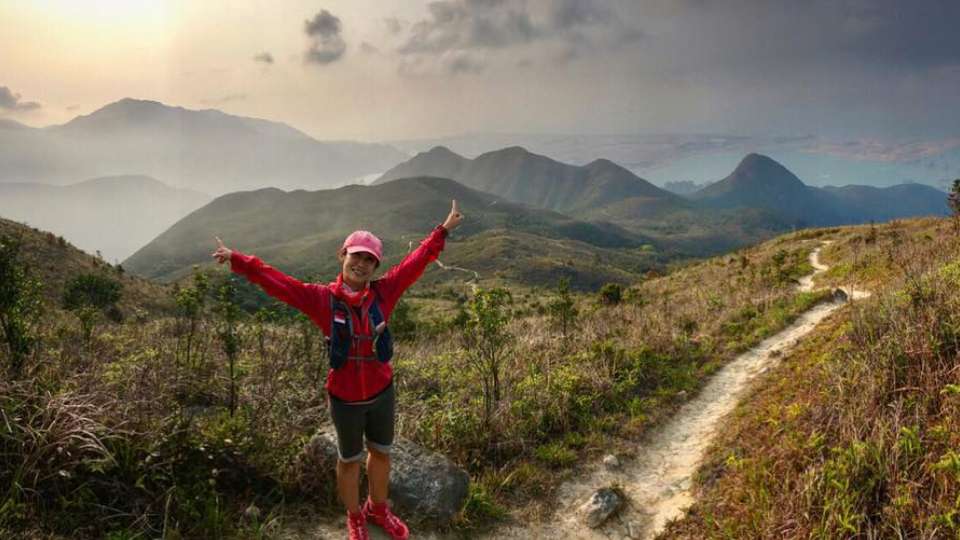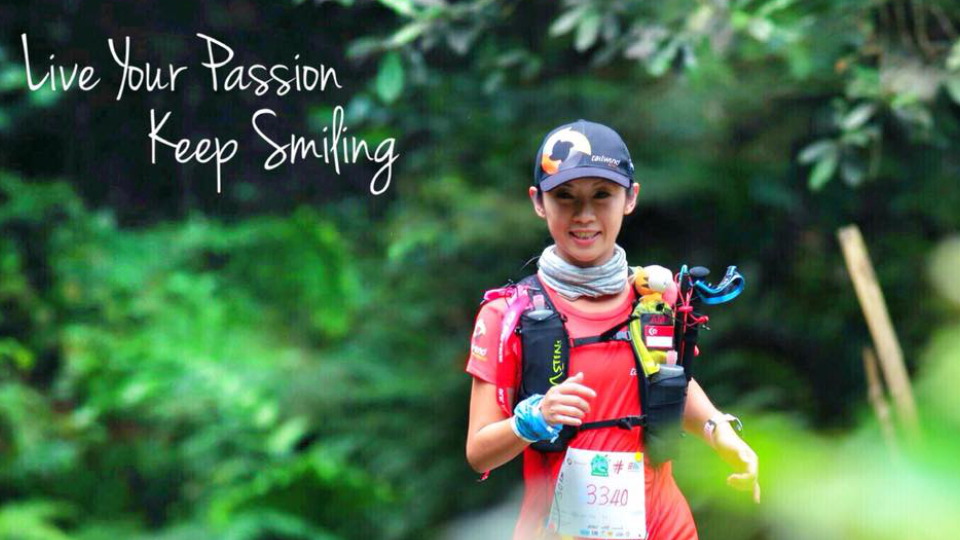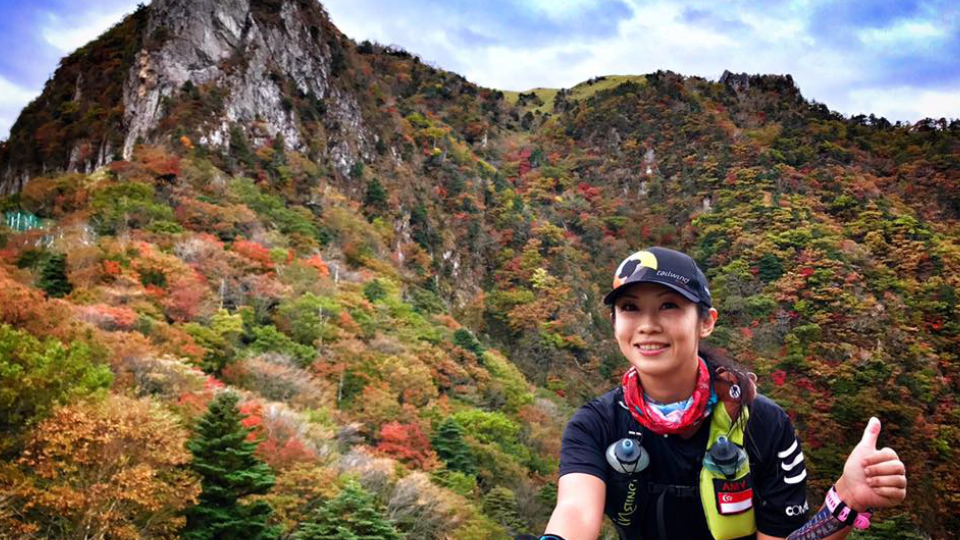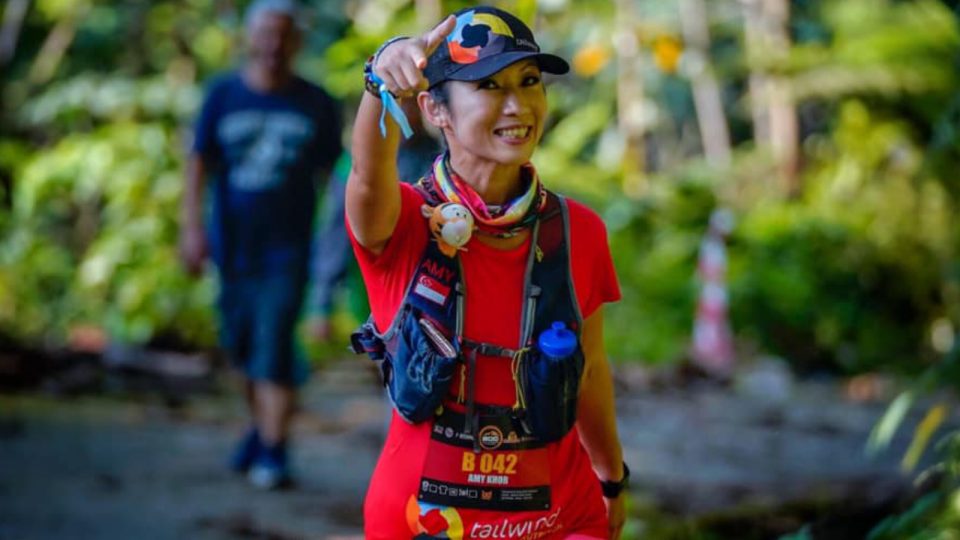45 year-old finance manager, Amy Khor has always been active in sports since school days. The Singaporean loves playing ball games and was in the basketball school team.
She also participates in track and field and cross country. When Amy steps out into the working world, family and work took up the majority of her commitments, hence she only visits the gym occasionally.
Amy started running again about 5 years ago, when she switched to a more work-life balance job that allows her to have a healthy lifestyle.
She began doing Yoga, Gym and running short distances (5km to 10km) on the road. Within a year, she decided to do her maiden ultra 50KM in TNF SINGAPORE.
From then on, the adrenaline high got her hooked on ultra running and she never likes running shorter distances anymore.
Ultra Running is about mental endurance that challenges her to push beyond her limits. Amy gets motivated and enjoys great satisfaction when she improve her running performance.
She always believes that the real journey is only against yourself and her unrealised potential. Today, we are glad to have the opportunity to find out her road to long distance trail running.

Be positive, humble and open to listen to others’ experience and sharing.
RS: When do you get interested in ultra trail running?
Amy: I started ultra trail running in 2015. The nature, trails and mountains are beautiful and ever changing. Mother Nature has a lot to explore, which keeps me sane.
RS: Ultra trail running is a very challenging sport. Why do you prefer trail running over normal running?
Amy: I like road running too. For trail running, it has more challenging variations in the journey, such as river/stream crossing, ridges, long bridges and rocky terrains. It injects excitement to explore what is coming next after another.
RS: Where is your favourite place for ultra trail training?
Amy: Unfortunately, Singapore has very limited trails for trail training. The usual playgrounds will be Bukit Timah Nature Reserve and MacRitchie Reservoir.
I also join friends to Malaysia (such as Gunung Pulai, Gunung Lambak) during available weekends for training. The terrains in Malaysia are more technical with higher elevation, enabling us to simulate the race terrain condition better.
RS: How do you plan and train for your ultra trail marathon?
Amy: Every race is different. I will plan and train specifically after doing some research on the level of technical difficulty, altitude, the kind of hill terrains, etc.
Depending on the race distance, the weekly mileage will deviate too. Training will usually include regular short runs, intervals, cross-training, back-to-back long runs during weekends. I also do yoga for recovery.
In saying that, recovery, nutrition and sleep are all important factors to prepare myself for the race day.

RS: How do you handle the stress and pressure during your training?
Amy: In fact, training takes my stress away from work and life. I usually feel pressure during training when I find that I cannot perform at my optimal efforts.
Honestly, the feeling is not great and I usually take a breather and have some nice desserts to take my mind off before I get re-organised and come back again.
RS: What was your most memorable race experience throughout your running journey?
Amy: The encouragement, smiles and cheering of the volunteers, crew and even strangers I met in my running journey are the best motivation that keeps me going in every race.
Ultra running is a long journey. There may be high and low moments. Small gestures such as hot coffee offered by a villager under winter temperature after a sleepless night is so heartwarming.
RS: Can you share with us some training tips to improve in ultra trail running?
Amy: Some of the tips are:
- Spend more time working on your weaknesses.
- Stretching and warm-up are important, especially when you have a hard workout.
- Include variations in training such as fartlek, tempos, intervals, cross-train, yoga, long-runs. It makes training more interesting.
- Sleep, eat and hydrate well daily, not just race day.
- Be disciplined and keep a positive mindset. Be with those people who can influence and help you to improve.
- Listen to your body if you want to run injury-free for the long-term.
- Never give up easily. Be mindful and re-organise yourself when you are feeling low.
- Keep a personal mantra to push yourself when the going gets tougher.
RS: What is the key to become a successful ultra trail runner?
Amy: Be positive, humble and open to listen to others’ experience and sharing. Learn and apply the good suitable ones for yourself, and unlearn those that don’t work for you. Always be alert to the surroundings you are in and always be prepared for unexpected situations.

The encouragement, smiles and cheering of the volunteers, crew and even strangers I met in my journey are the best motivation that keeps me going in every race.
RS: Can you share with us a 7 week training for beginners who want to go for an ultra trail race?
Amy: Everyone has different lifestyles and commitment. I have sought advice from running friends for training programs, which I will try my best to follow through to race day.
As much as I wish to commit to a structured training program, it is not easy due to my other commitments in family, work and life. Thus, I tweaked my training plan, when necessary, to cater for my training needs.
For weekends, I usually train on trails or staircase (if I am training for HK races). For midweek long run, it will usually be at the park connectors.
Depending on every race profile, we should plan our training specifically with respective to factors such as altitude, elevation gain, types and technicality level of the terrains.
Lastly, we should always have a balance in everything, Family, Work, Life and Health.
My Ultra Trail Race Training Plan:
- Monday – Recovery Run (10KM)
- Tuesday – Morning Easy Run (10KM); Evening Track Intervals
- Wednesday – Long Run (17KM – 24KM)
- Thursday – Cross-Training & Yoga
- Friday – Rest / Yoga
- Saturday – Long Run (18KM – 25KM ) with elevation (trails/hills/staircase)
- Sunday – Long Run (18KM – 25KM ) with elevation (trails/hills/staircase)
The intensity of training will defer week to week, leading to race-day. I will also moderate my training according to my body condition, to prevent risk of injuries.
RS: What is the one thing we might not know about you?
Amy: I actually don’t run during training when I first started in this sport. I only go to the gym for Body Combat and cardio classes.
It’s through learning that I know I need to have a proper balance mix of everything that includes of course running, to work towards the goals I want to achieve.
When you run an ultramarathon, you run against the distance, not against the other runners and not against the time.
What questions would you like to ask Amy, if you get to meet her in a trail run?





